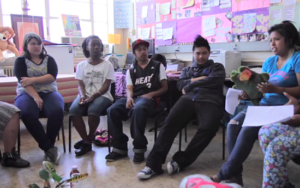Schools in the Oakland Unified School District have implemented an innovative new plan to deal with misconduct that it hopes will reduce suspensions and expulsions.
Instead of using these harsh punishments for students who get into fights or have other disciplinary infractions, the restorative justice program resolves these conflicts by encouraging a group dialogue to work it out. The program was expanded in 2012 after a federal civil rights agreement passed in order to reduce school discipline inequity.
Data from the Office for Civil Rights at the United States Department of Education has shown that from 2011 to 2012, Black girls in public elementary and secondary schools in the US have been suspended at a rate of 12 percent, compared to 2 percent for white girls. They are also more likely to be suspended than girls of any other race.
In order to combat statistics like these, the Oakland Unified School District has become a national leader in these new restorative justice programs. Being one of the largest school districts in California, the district is one-third African-American and more than 70 percent low-income.
Edna Brewer Middle School is one school in the district that is reaping the benefits of the program.
“Instead of throwing a punch, they’re asking for a circle, they’re backing off and asking to mediate it peacefully with words,” Ta-Biti Gibson, the school’s restorative justice co-director, told NPR. “And that’s a great thing.”
“Last year there was a lot of different conflicts, a lot of fights,” Gibson said. He confirmed that this year the kids have been willing to “circle up” and talk their problems out.
The district claims that the percentage of students suspended at schools utilizing the program has dropped by half, from 34 percent in 2011-12 to 14 percent the next two years. They also claim that the chronic absence rate in students has gone down. Two schools in the district eliminated disproportionate suspensions of Black students last year.
Schools in Chicago, Minneapolis, Palm Beach County, Fla. and Denver are among several other districts implementing their own versions of the program.



